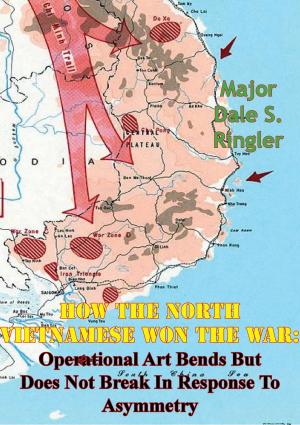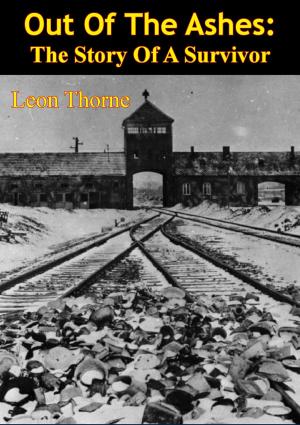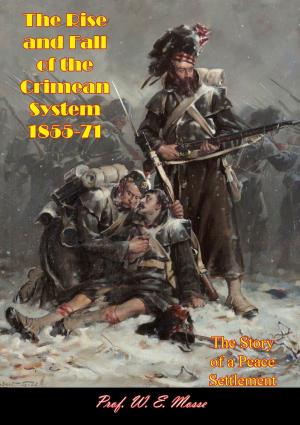Operation SEALORDS: A Study In The Effectiveness Of The Allied Naval Campaign Of Interdiction
Nonfiction, History, Military, Vietnam War, Asian, United States| Author: | LCDR Eugene F. Paluso USN | ISBN: | 9781786250179 |
| Publisher: | Normanby Press | Publication: | November 6, 2015 |
| Imprint: | Normanby Press | Language: | English |
| Author: | LCDR Eugene F. Paluso USN |
| ISBN: | 9781786250179 |
| Publisher: | Normanby Press |
| Publication: | November 6, 2015 |
| Imprint: | Normanby Press |
| Language: | English |
The United States Navy involvement in the Vietnam War prior to 1964 was primarily blue water operations. In 1964, the Vietnam Delta Infiltration Study Group was tasked to conduct a comprehensive study of the problem of enemy infiltration of men and supplies into South Vietnam Mekong Delta region across the Cambodia and Laos borders. The findings of the group were published in the Bucklew Report and concluded that the border infiltration problem was significant and needed to be stopped in order to ensure victory in the Vietnam War. The recommendations were for the U.S. to develop an extensive riverine operations capability to assist the South Vietnamese military in conducting counter-insurgency operations to stop the infiltration problem.
The U.S. Navy moved from deep blue water operations to near shore blue water operations with the Operation MARKET TIME patrols, which encompassed larger seagoing craft patrolling the coast to forty miles out to sea. These operations led to the first brown water operations during Operation GAME WARDEN which patrolled the major river systems in the Mekong Delta region in order to interdict enemy movements along the rivers. Soon these patrols revealed the need to ground troops to control the riverbanks in order for the patrols to be effective.
The Tet offensive of 1968 revealed that the MARKET TIME and GAME WARDEN patrols were not totally containing the infiltration problem. Operation SEALORDS established patrol barriers that were designed specifically to stop the influx of men and supplies crossing the Cambodian border and sustaining enemy forces operating in the Mekong Delta and Saigon areas. SEALORDS barriers were systematically set up to take control of the Mekong Delta region and deny the enemy the freedom of movement enjoyed for years prior.
The United States Navy involvement in the Vietnam War prior to 1964 was primarily blue water operations. In 1964, the Vietnam Delta Infiltration Study Group was tasked to conduct a comprehensive study of the problem of enemy infiltration of men and supplies into South Vietnam Mekong Delta region across the Cambodia and Laos borders. The findings of the group were published in the Bucklew Report and concluded that the border infiltration problem was significant and needed to be stopped in order to ensure victory in the Vietnam War. The recommendations were for the U.S. to develop an extensive riverine operations capability to assist the South Vietnamese military in conducting counter-insurgency operations to stop the infiltration problem.
The U.S. Navy moved from deep blue water operations to near shore blue water operations with the Operation MARKET TIME patrols, which encompassed larger seagoing craft patrolling the coast to forty miles out to sea. These operations led to the first brown water operations during Operation GAME WARDEN which patrolled the major river systems in the Mekong Delta region in order to interdict enemy movements along the rivers. Soon these patrols revealed the need to ground troops to control the riverbanks in order for the patrols to be effective.
The Tet offensive of 1968 revealed that the MARKET TIME and GAME WARDEN patrols were not totally containing the infiltration problem. Operation SEALORDS established patrol barriers that were designed specifically to stop the influx of men and supplies crossing the Cambodian border and sustaining enemy forces operating in the Mekong Delta and Saigon areas. SEALORDS barriers were systematically set up to take control of the Mekong Delta region and deny the enemy the freedom of movement enjoyed for years prior.



![Cover of the book Seventy-One Years Of A Guardsman’s Life [Illustrated Edition] by LCDR Eugene F. Paluso USN](https://www.kuoky.com/images/2014/august/300x300/9781782899204-3Spp_300x.jpg)


![Cover of the book With Havelock From Allahabad To Lucknow [Illustrated Edition] by LCDR Eugene F. Paluso USN](https://www.kuoky.com/images/2014/august/300x300/9781782894704-rmkg_300x.jpg)
![Cover of the book Old Memories (Of The Indian Mutiny 1857) [Illustrated Edition] by LCDR Eugene F. Paluso USN](https://www.kuoky.com/images/2014/august/300x300/9781782894896-UeCc_300x.jpg)

![Cover of the book Outpost War: U.S. Marines From The Nevada Battles To The Armistice [Illustrated Edition] by LCDR Eugene F. Paluso USN](https://www.kuoky.com/images/2015/november/300x300/9781786256065-MXac_300x.jpg)
![Cover of the book FIRE BRIGADE: U.S. Marines In The Pusan Perimeter [Illustrated Edition] by LCDR Eugene F. Paluso USN](https://www.kuoky.com/images/2015/november/300x300/9781786251619-wyoa_300x.jpg)
![Cover of the book Mafeking: A Diary Of The Siege [Illustrated Edition] by LCDR Eugene F. Paluso USN](https://www.kuoky.com/images/2014/june/300x300/9781782891253-ZHWc_300x.jpg)
![Cover of the book The Stars Bear Witness [Illustrated Edition] by LCDR Eugene F. Paluso USN](https://www.kuoky.com/images/2015/november/300x300/9781786254757-THHk_300x.jpg)

![Cover of the book Stalemate: U.S. Marines From Bunker Hill To The Hook [Illustrated Edition] by LCDR Eugene F. Paluso USN](https://www.kuoky.com/images/2015/november/300x300/9781786256072-vFZF_300x.jpg)
